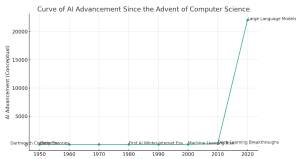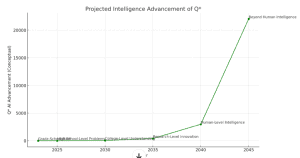The landscape of artificial intelligence (AI) is ever-evolving, with each new development bringing us closer to more sophisticated and versatile forms of intelligence. The recent speculative discussions around OpenAI’s theoretical Q* offer an opportunity to contextualize this advancement in AI, comparing it with existing technologies like advanced language models and computational engines such as Wolfram Alpha.
Language models like GPT-4 represent the current zenith of narrow AI. They excel in understanding and generating human language, using vast amounts of text data to learn and predict language patterns. These models have revolutionized fields like natural language processing, content creation, and even complex problem-solving within the linguistic domain.
Language models like GPT-4, which are deep learning-based and rely heavily on neural networks, particularly transformer models, represent a significant stride in AI. They are trained on large-scale datasets with diverse language inputs, excelling in tasks directly related to language processing but lacking in broader cognitive abilities.
In contrast, tools like Wolfram Alpha, known for its specialized computational intelligence, stand out as powerful computational tools designed to provide answers to factual queries and perform complex mathematical computations, functioning as knowledge-based systems that utilize vast databases and specific algorithms for information processing.
But they can’t yet apply what they know to new solutions. Yes, AI can make new algorithms, but they can’t yet independently take those algorithms and adapt them to new circumstances.
Which is what makes Q* potentially so enticing and world changing.
Wolfram Alpha, and tools like it, operate as knowledge-driven platforms, using predefined algorithms and cleaned data to provide accurate answers. Yet they are limited in that they primarily focus on computation and knowledge retrieval without substantial learning capabilities. In other words they have a lot of information but they aren’t really intelligent, and they have no agency.
In contrast, theoretical reports about Q* suggest a major achievement has been reached towards Artificial General Intelligence (AGI), with capabilities extending beyond the specialized realms of language models like GPT-4 and computational tools like Wolfram Alpha.
Q* is envisioned to tackle general problem-solving across various domains, not just confined to language or computation. It is speculated to be capable of adaptive learning, improving over time from experiences, and possessing a broader contextual understanding that allows it to apply knowledge and skills across diverse contexts. This represents a significant paradigm shift, where Q* is theorized to transcend the limitations of specialized AI, offering a more dynamic and holistic form of intelligence.
To fully appreciate the significance of new developments like Q* you need to understand how far we’ve come in a very short period of time. AI, in its simplest form, refers to machines programmed to perform tasks that typically require human intelligence, such as recognizing speech, making decisions, or translating languages. Current AI systems fall largely under ‘narrow AI’, which are highly specialized in specific tasks. See the charts below to give you an idea of the scale and scope of a potential advancement like this, keep in mind it’s speculative AND these are for illustration only.


For instance, language models like GPT-4 are adept at processing and generating human language, while Wolfram Alpha is a computational knowledge engine, used for answering factual queries and performing complex calculations. These systems, although advanced, are limited to the specific tasks they’re designed for and lack the broader cognitive abilities that humans possess.
Theoretical reports about Q*, however, suggest a potential leap towards AGI, a type of AI that could perform a wide range of intellectual tasks, mimicking human cognitive abilities. Unlike specialized AI systems, AGI would theoretically be capable of understanding and learning from a variety of contexts, adapting its knowledge to solve new and diverse problems. This represents a major shift from the current AI paradigm; while systems like GPT-4 and Wolfram Alpha operate within their respective niches of language and computation, Q* is speculated to transcend these boundaries, offering a more dynamic and holistic form of intelligence.
It’s important to note, though, that Q* remains a theoretical concept and has not been publicly demonstrated or verified. As such, while discussions around Q* highlight the ambition and potential direction of AI research, they also underscore the need for careful consideration of ethical and safety issues that accompany such advanced technological developments.
The conversation surrounding the theoretical Q* invites us to envision a future where AI transcends its current limitations, stepping into the realm of AGI with the potential to mimic the expansive cognitive abilities of humans. This shift from specialized systems like GPT-4 and Wolfram Alpha to a more versatile and adaptable form of AI could mark a significant milestone in our technological journey.
However, it’s imperative to approach these speculative developments with a balanced perspective. While the possibilities are exciting, they bring with them a host of ethical, safety, and societal implications that must be carefully navigated. As we stand on the brink of what could be the next great leap in AI, it becomes crucial to foster a dialogue that not only fuels innovation but also prioritizes responsible and ethical advancement.
The story of Q*—whether it materializes into reality or remains a theoretical concept—serves as a catalyst for this important conversation, urging us to prepare for a future where AI’s role in our lives could be fundamentally redefined.
And finally, keep in mind that this is one tool, within one company, amongst dozens of very well-funded juggernauts with nearly unlimited computational resources and brain power. If a spunky little “nonprofit” with fewer than 300 people can come this far (the actual research team that may or may not have accomplished this feat was likely only a handful of people), just imagine what all the other behemoths have accomplished after hoovering in every Facebook post, every email, and every Google search for the last decade, oh and don’t forget those fun little cameras on your smart phones that you stare into on the daily! Happy internetting and stay tuned for more crazy advancements in the world of technology happening every minute!


